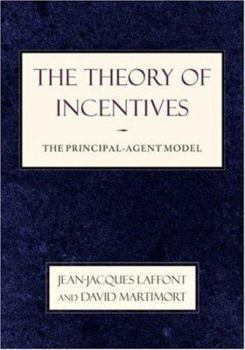The Theory of Incentives: The Principal-Agent Model
Select Format
Select Condition 
Book Overview
Economics has much to do with incentives--not least, incentives to work hard, to produce quality products, to study, to invest, and to save. Although Adam Smith amply confirmed this more than two hundred years ago in his analysis of sharecropping contracts, only in recent decades has a theory begun to emerge to place the topic at the heart of economic thinking. In this book, Jean-Jacques Laffont and David Martimort present the most thorough yet...
Format:Paperback
Language:English
ISBN:0691091846
ISBN13:9780691091846
Release Date:January 2002
Publisher:Princeton University Press
Length:440 Pages
Weight:1.72 lbs.
Dimensions:1.1" x 7.0" x 10.0"
Customer Reviews
5 ratings
Very good well written book
Published by Thriftbooks.com User , 14 years ago
This book rates 5 stars because it is suprisingly easy to read for such a heavy deep subject. The examples and qoutes are well place and very illustrative. I would very much recommend this book. The most outstanding aspect is the way it approaches the theories on a small scale and expands them incrementally to secure the readers understanding at each stage of the "flow".
Review Theory of Incentives
Published by Thriftbooks.com User , 16 years ago
This book is really good for people studying contract theory and with some knowledge of game theory. Slightly advanced, but really good.
Master Piece from the Master
Published by Thriftbooks.com User , 20 years ago
The book provides a systhesis of contract theory at the phd level. It begins with basic idea of adverse selection and then its extension and followed by basic moral hazard model and its extension. The selected topics are presented here in a consistent fashion of the main ideas. Applications are well presented along the models.Nonverifiability, the mixed model of adverse selection and moral hazard and some dynamic aspects of the two are also incorporated in a great deal of details. This is the text on incentive theory, not just introduction. Its comprehensive insights are useful and time-saving for readers. You need not to read a bulk of papers, after reading the book, you just complement it with some core papers of the topics. (such as multidimensional screening, random participation)If there is some weakness, it would be that... the authors present some topics too short and some notation used are not well explained, particularly the extension of the core models and some selected topics.Anyways, i found it helpful and complete for studying incentive theory but it requires deep understanding of optimization theory and some experience of economic-theorethic arguments.This book is written by a major contributor of the field. It would be hard to write another book to compete with this one in the field. . .
excellent book
Published by Thriftbooks.com User , 20 years ago
A very clear book on the topic of information theory; pretty much everything you need as a graduate student. Covers all topics in substantial detail but with models that capture only the effects that are relevant. A great buy.
Best book on the topic
Published by Thriftbooks.com User , 20 years ago
This is a fabulous book, destined to become a classic reference summarizing some 30 years of research in a field that has now become mature and which has completely redefined and expanded the field of Modern Economics. Jean Jacques Laffont is a sure-bet future Nobel laureate for his contributions to the field (likely to be shared with that other Toulouse-based giant Jean Tirole). Martimort is a rising star in his own right. This volume, the first in what is described as a two-volume survey, should be on the bookshelf of any serious economist or any graduate student trying to work her way through a serious first or second year microeconomic theory. It could also be used effectively to teach a first-year graduate or an advanced undergraduate course on asymmetric information and contracts. What is so nice about the book pedagogically in my view is the way the authors have synthesized so many results by working with variants of simple models. It's the power of elegant simplicity. When looking at moral hazard for example, they start with the simplest two outcome, two action problem, with a risk-neutral principal and agent. Then they slowly and selectively complicate the same base model (e.g. adding a limited liability constraint, making the agent risk averse, allowing for more action levels and outcomes, adding more tasks, more agents, etc). Hence you get the essential insights without being overly burdened from the start with cumbersome notation. They have several nice graphical representations to accompany the very well written intuitive explanations. The end result is that you end up seeing with clarity how many results in the literature, that had previously seemed disparate, tie together very neatly and share a common mathematical structure. The authors state in the introduction (which is a brilliant historical survey of ideas and the development of the field) that they plan a second volume on multi-agent contracts and mechanism design. It should also be fabulous and will hopefully help to popularize and democratize an area of economics that is packed with essential insights for understanding political economy and the behavior of groups, hiearchies and organizations, yet has mostly been left to mathematical economists. There are other books out there like Macho-Stadler et al' "An Introduction to the Economics of Information: Incentives and Contracts" and Salanie's "The Economics of Contracts" which are targeted at a similar audience. These are quite good in their own right, but do not have the breadth and insight of this volume.




